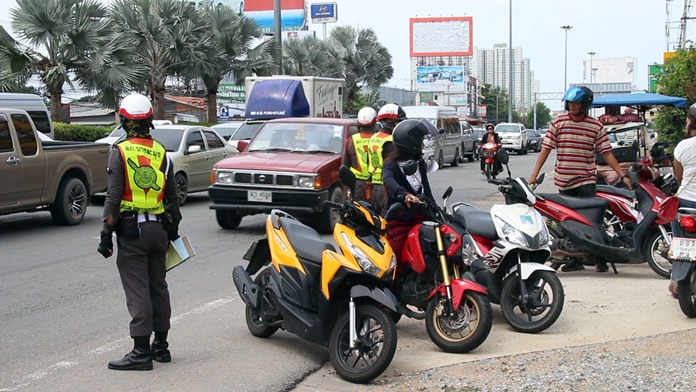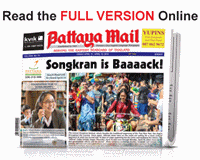
Songkran is well underway in Thailand and Pattaya police are on the streets trying to keep people alive.
 Traffic Division Chief Pol. Maj. Orut Sapanon said April 3 that more tourists are expected in Pattaya this year, as 2017’s Thai New Year was muted due to the royal mourning period. As such, traffic police have had to step up their game.
Traffic Division Chief Pol. Maj. Orut Sapanon said April 3 that more tourists are expected in Pattaya this year, as 2017’s Thai New Year was muted due to the royal mourning period. As such, traffic police have had to step up their game.
Daily checks of all buses, minivans and other public-transport vehicles began on April 1 with drivers being tested for alcohol or drug use.
Checkpoints also have been established throughout the area to check for drunk drivers, motorcyclists without helmets and drivers without licenses – all of which contribute to Thailand’s appalling highway fatality rate during every Songkran.
For the official April 13-15 holiday, all roads will be open with at least two police officers assigned to each major intersection.
On April 18, the “wan lai” water festival day for Naklua, police will be stationed around the Dolphin Roundabout to support residents and check on safety.
On Pattaya’s April 19 wan lai Beach Road, from the roundabout to Walking Street will be closed and vehicles will not be allowed from 6 a.m. to 7 p.m., subject to change.
Second Road will be open and all sidestreets will be accessible but blocked off at the Beach Road end. North Road will see its construction halted for wan lai.
Orut added that Sukhumvit Road, at the junctions of Pattaya’s main roads, also have police and volunteers stationed to support tourists and residents and the traffic.
All stations concerned will consist of medical support, volunteers and police at all times so that help can be provided instantly to those in need.





